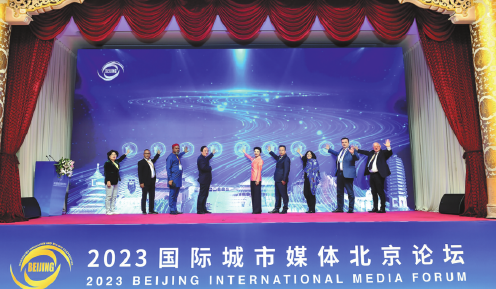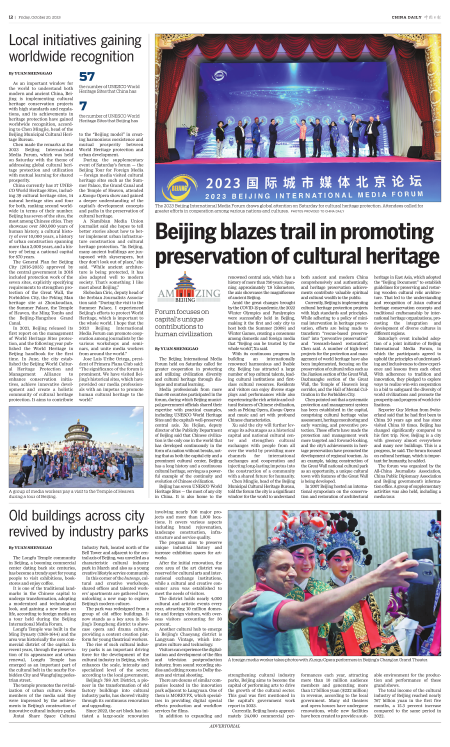

The 2023 Beijing International Media Forum draws global attention on Saturday for cultural heritage protection. Attendees called for greater efforts in cooperation among various nations and cultures.
The Beijing International Media Forum held on Saturday called for greater cooperation in protecting and utilizing civilization diversity and cultural heritage through dialogue and mutual learning.
Media professionals from more than 60 countries participated in the forum, during which Beijing municipal government officials shared their expertise with practical examples, including UNESCO World Heritage Sites and the capital's well-preserved central axis. Xu Hejian, deputy director of the Publicity Department of Beijing said that Chinese civilization is the only one in the world that has developed continuously in the form of a nation without breaks, noting that as both the capital city and a prominent cultural center, Beijing has a long history and a continuous cultural heritage, serving as a powerful example of the continuity and evolution of Chinese civilization.
Beijing has seven UNESCO World Heritage Sites — the most of any city in China. It is also home to the renowned central axis, which has a history of more than 750 years. Spanning approximately 7.8 kilometers, the axis showcases the magnificence of ancient Beijing.
Amid the great changes brought by the COVID-19 pandemic, the 2022 Winter Olympics and Paralympics were successfully held in Beijing, making it the first and only city to host both the Summer (2008) and Winter Games, creating a consensus among domestic and foreign media that "Beijing can be trusted by the whole world", Xu said.
With its continuous progress in building an internationally renowned harmonious and livable city, Beijing has attracted a large number of top cultural talents, leading cultural institutions and first-class cultural resources. Residents and visitors can enjoy diverse stage plays and performances while also experiencing the rich artistic and cultural features of Chinese civilization, such as Peking Opera, Kunqu Opera and music and art with profound Chinese characteristics.
Xu said the city will further leverage its advantages as a historical capital and national cultural center and strengthen cultural exchanges with people from all over the world by providing more channels for international exchanges and cooperation and injecting long-lasting impetus into the construction of a community with a shared future for humanity.
Chen Mingjie, head of the Beijing Municipal Cultural Heritage Bureau, told the forum the city is a significant window for the world to understand both ancient and modern China comprehensively and authentically, and heritage preservation achievements contribute valuable spiritual and cultural wealth to the public.
Currently, Beijing is implementing cultural heritage protection projects with high standards and principles. While adhering to a policy of minimal intervention in heritage preservation, efforts are being made to transform "rescue-based preservation" into "preventive preservation" and "research-based restoration", Chen said. A number of high-level projects for the protection and management of world heritage have also been implemented, focusing on the preservation of cultural relics such as the Jiankou section of the Great Wall, Dazhuangke section of the Great Wall, the Temple of Heaven's long corridor, and the Hall of Mental Cultivation in the Forbidden City.
Chen pointed out that a systematic protection and management system has been established in the capital, comprising cultural heritage value assessment, heritage monitoring and early warning, and preventive protection. Those efforts have made the protection and management work more targeted and forward-looking, and the city's achievements in heritage preservation have promoted the development of regional tourism. As an example, taking construction of the Great Wall national cultural park as an opportunity, a unique cultural town with features of the Great Wall is being developed.
In 2007 Beijing hosted an international symposium on the conservation and restoration of architectural heritage in East Asia, which adopted the "Beijing Document" to establish guidelines for preserving and restoring wooden cultural relic architecture. That led to the understanding and recognition of Asian cultural heritage conservation concepts and traditional craftsmanship by international heritage organizations, promoting the integration and development of diverse cultures in different regions.
Saturday's event included adoption of a joint initiative of Beijing International Media Forum, in which the participants agreed to uphold the principles of understanding and inclusiveness to draw experience and lessons from each other. With adherence to tradition and innovation, they pledged to explore ways to realize win-win cooperation in a bid to safeguard the diversity of world civilizations and promote the prosperity and progress of world civilizations.
Reporter Guy Mettan from Switzerland said that he had first been to China 20 years ago and has since visited China 10 times. Beijing has changed significantly compared to his first trip. Now, Beijing is a city with greenery almost everywhere and many new buildings. This is a progress, he said. The forum focused on cultural heritage, which is important for humanity, he added.
The forum was organized by the All-China Journalists Association, China Public Diplomacy Association and Beijing government's information office. A group of supplementary activities was also held, including a media tour.

